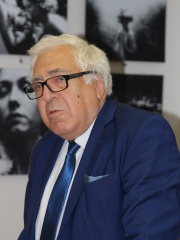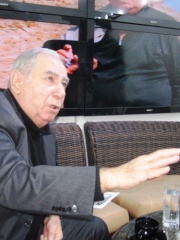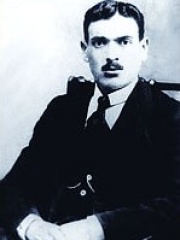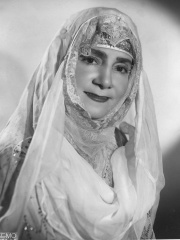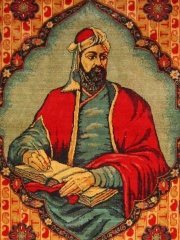
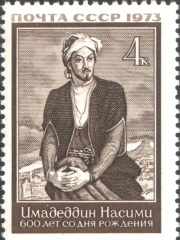

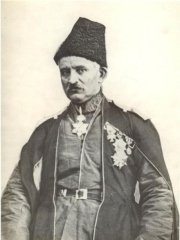
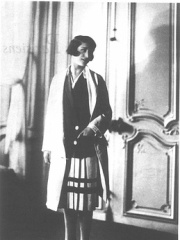
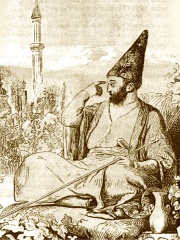
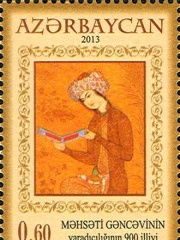
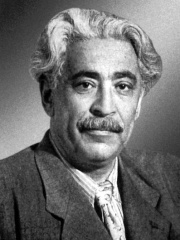
The Most Famous
WRITERS from Azerbaijan
This page contains a list of the greatest Azerbaijani Writers. The pantheon dataset contains 7,302 Writers, 30 of which were born in Azerbaijan. This makes Azerbaijan the birth place of the 39th most number of Writers behind Estonia, and Iraq.
Top 10
The following people are considered by Pantheon to be the top 10 most legendary Azerbaijani Writers of all time. This list of famous Azerbaijani Writers is sorted by HPI (Historical Popularity Index), a metric that aggregates information on a biography's online popularity. Visit the rankings page to view the entire list of Azerbaijani Writers.

1. Nizami Ganjavi (1141 - 1209)
With an HPI of 78.77, Nizami Ganjavi is the most famous Azerbaijani Writer. His biography has been translated into 70 different languages on wikipedia.
Nizami Ganjavi (Persian: نظامی گنجوی, romanized: Niẓāmī Ganjavī, lit. 'Niẓāmī of Ganja'; c. 1141 – 1209), Nizami Ganje'i, Nizami, or Nezāmi, whose formal name was Jamal ad-Dīn Abū Muḥammad Ilyās ibn-Yūsuf ibn-Zakkī, was a 12th-century poet. Nizami is considered the greatest romantic epic poet in Persian literature, who brought a colloquial and realistic style to the Persian epic. His heritage is widely appreciated in Afghanistan, Republic of Azerbaijan, Iran, the Kurdistan region and Tajikistan.

2. Imadaddin Nasimi (1369 - 1417)
With an HPI of 71.86, Imadaddin Nasimi is the 2nd most famous Azerbaijani Writer. His biography has been translated into 35 different languages.
Seyid Ali Imadaddin Nasimi (Azerbaijani: سئید علی عمادالدّین نسیمی, romanized: Seyid Əli İmadəddin Nəsimi; c. 1369/70 – c. 1418/19), commonly known as simply Nasimi (نسیمی, Nəsimi), was a 14th- and 15th-century Hurufi poet who composed poetry in his native Azerbaijani, as well as Persian and Arabic languages. He is regarded as one of the greatest Turkic poets of his time and one of the most prominent figures in Azerbaijani literature. Born around 1369–70, Nasimi received a good education and was drawn to Sufism at an early age. After becoming a faithful adherent of the Hurufism movement, Nasimi left Azerbaijan to spread Hurufism in Anatolia and later Aleppo following the execution of its founder and Nasimi's teacher, Fazlallah Astarabadi. In Aleppo, he gained followers as a Hurufi sheikh but faced resistance from Sunni circles who eventually convinced the Mamluk sultan to order his death for his religious beliefs around 1418–19. Nasimi was executed and buried in a Sufi lodge (takya) in Aleppo. His surviving works include two dīvāns (collections of poems) in Azerbaijani and Persian, along with some poems in Arabic. Nasimi's poems mainly centre around Hurufism and contain many references to Islamic texts. His poetry combines harmonious melodies and easily understood expressions with more complex topics related to religion. Nasimi had great influence on Turkic literature and influenced many major future poets such as Habibi, Haqiqi (pen name of Jahan Shah), Khatai (pen name of Ismail I), among others. He is also considered the founder of Azerbaijani classical ʿarūż poetry (poetry using quantifying prosody) and ghazal poetry (a form of love poetry), as well as the first lyric poet in Oghuz Turkic classic literature.

3. Zecharia Sitchin (1920 - 2010)
With an HPI of 70.81, Zecharia Sitchin is the 3rd most famous Azerbaijani Writer. His biography has been translated into 30 different languages.
Zecharia Sitchin (11 July 1920 – 9 October 2010) was an author of a number of books proposing an explanation for human origins involving ancient astronauts. Sitchin attributed the creation of the ancient Sumerian culture to the Anunnaki, which he claimed was a race of extraterrestrials from a planet beyond Neptune called Nibiru. He claimed that Sumerian mythology suggests that this hypothetical planet of Nibiru is in an elongated, 3,600-year-long elliptical orbit around the Sun. Sitchin's books have sold millions of copies worldwide and have been translated into more than 25 languages. Sitchin's ideas have been resoundingly rejected by scientists, academics, historians (including Sumerologists, Orientalists and Assyriologists) and anthropologists who dismiss his work as pseudoscience and pseudohistory. His work has been criticized for flawed methodology, ignoring archaeological and historical evidence, and mistranslations of ancient texts as well as for incorrect astronomical and scientific claims.

4. Mirza Fatali Akhundov (1812 - 1878)
With an HPI of 68.46, Mirza Fatali Akhundov is the 4th most famous Azerbaijani Writer. His biography has been translated into 36 different languages.
Mirza Fatali Akhundov, also known as Mirza Fatali Akhundzade, or Mirza Fath-Ali Akhundzadeh (12 July 1812 – 9 March 1878), was a celebrated Iranian Azerbaijani author, playwright, atheist, philosopher, and literary critic who lived most of his life in the Russian Empire. He became famous mainly for his European-inspired plays written in Azerbaijani. Akhundzade singlehandedly opened a new stage of development of Azerbaijani literature. Through Persian translation, his plays also played an important role in the birth of modern Iranian theater. He was also the founder of the materialist and atheist movement in the Republic of Azerbaijan and one of the forerunners of modern Iranian nationalism. He also advocated switching the Azerbaijani writing system from the Perso-Arabic script to the Latin alphabet. According to the historian and political scientist Zaur Gasimov, the entirety of Akhundzadeh's intellectual landscape was "densely entangled with Persian thought". Akhundzadeh defined his kinsmen as Turki, but at the same time considered Iran his fatherland. Politically, he has been described as "a tsarist official of impeccable loyalty", and he viewed Russian rule as a force for modernisation in the Caucasus.
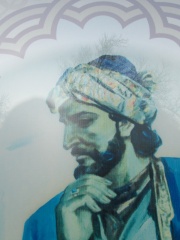
5. Khaqani (1126 - 1199)
With an HPI of 65.14, Khaqani is the 5th most famous Azerbaijani Writer. His biography has been translated into 26 different languages.
Afzal al-Dīn Badīl ibn ʿAlī ibn ʿOthmān (Persian: افضلالدّین بدیل بن علی بن عثمان), commonly known as Khāqānī (Persian: خاقانی, IPA: [xɒːɣɒːˈniː], c. 1120 – c. 1199), was a major Persian poet and prose-writer. He was born in Transcaucasia in the historical region known as Shirvan, where he served as an ode-writer to the Shirvanshahs. His fame most securely rests upon the qasidas collected in his Divān, and his autobiographical travelogue Tohfat al-ʿErāqayn. He is also notable for his contributions to the genre of habsiyāt ("prison poetry").

6. Banine (1905 - 1992)
With an HPI of 64.98, Banine is the 6th most famous Azerbaijani Writer. Her biography has been translated into 27 different languages.
Umm-El-Banine Assadoulaeff (Ummulbanu Asadullayeva; 18 December 1905 – 23 October 1992) was a French writer of Azerbaijani descent who wrote under the penname of Banine.

7. Mirza Shafi Vazeh (1794 - 1852)
With an HPI of 63.21, Mirza Shafi Vazeh is the 7th most famous Azerbaijani Writer. His biography has been translated into 28 different languages.
Mirza Shafi Vazeh (Azerbaijani: Mirzə Şəfi Vazeh; میرزا شفیع واضح; c. 1800 – 16 November 1852) was an Azerbaijani poet and teacher. Under the pseudonym "Vazeh", which means "expressive, clear", he wrote in both Azerbaijani and Persian, developing the traditions of poetry in both languages. He compiled the first anthology of Azerbaijani poetry and a Tatar-Russian dictionary for the Tiflis gymnasium with Russian teacher Ivan Grigoriev. He wrote multiple ghazals, mukhammases, mathnawis and rubais. His poems are mostly intimate, lyrical and satirical. The main theme of Vazeh's works is the glorification of romantic love and the joy of life, but in some of his poems, he denounces the vices of feudal society and opposes slavery and religious fanaticism. The German poet Friedrich von Bodenstedt, who took oriental language lessons from Vazeh, published translations of Vazeh's poems in his book A Thousand and One Days in the East in 1850. Bodenstedt's book, titled Songs of Mirza Shafi, was published in 1851.

8. Mahsati (1089 - 1181)
With an HPI of 62.59, Mahsati is the 8th most famous Azerbaijani Writer. Her biography has been translated into 20 different languages.
Mahsati (Persian: مهستی, romanized: Mahsati) was a medieval Persian female poet who was reportedly one of the first poets to compose ruba'iyat (quatrains) in her native language.

9. Samad Vurgun (1906 - 1956)
With an HPI of 60.69, Samad Vurgun is the 9th most famous Azerbaijani Writer. His biography has been translated into 25 different languages.
Samad Vurgun (Azerbaijani: Səməd Vurğun [sæˈmæd vuɾˈɣun]; born Samad Yusif oghlu Vekilov; 21 March 1906 – 27 May 1956) was an Azerbaijani and Soviet poet, dramatist, public figure, first People's Artist of the Azerbaijan SSR (1943), academician of Azerbaijan National Academy of Sciences (1945), laureate of two Stalin Prizes of second degree (1941, 1942), and member of the Communist Party of the Soviet Union from 1940. The Azerbaijan State Academic Russian Drama Theatre and streets in Baku and Moscow, and formerly the city of Hovk in Armenia, are named after him. Samad Vurgun is the first poet in the literature history of Azerbaijan who was given the title “The Poet of Public”.
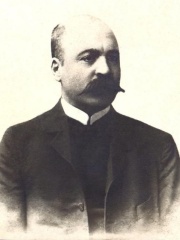
10. Jalil Mammadguluzadeh (1869 - 1932)
With an HPI of 60.50, Jalil Mammadguluzadeh is the 10th most famous Azerbaijani Writer. His biography has been translated into 23 different languages.
Jalil Huseyngulu oghlu Mammadguluzadeh (Azerbaijani: جلیل مَمَغُلوزاده, Cəlil Məmmədquluzadə; 22 February 1869 – 4 January 1932), was an Azerbaijani satirist and writer. He was the founder of Molla Nasraddin, a satirical magazine that would greatly influence the genre in the Middle East and Central Asia. Mammadguluzadeh is considered to be one of the first women's rights activists in Azerbaijan and Middle East and had a big role in founding the first women's magazine in Azerbaijan.
People
Pantheon has 30 people classified as Azerbaijani writers born between 1089 and 1959. Of these 30, 4 (13.33%) of them are still alive today. The most famous living Azerbaijani writers include Anar Rzayev, Akram Aylisli, and Chingiz Abdullayev. The most famous deceased Azerbaijani writers include Nizami Ganjavi, Imadaddin Nasimi, and Zecharia Sitchin.
Living Azerbaijani Writers
Go to all RankingsAnar Rzayev
1938 - Present
HPI: 58.00
Akram Aylisli
1937 - Present
HPI: 56.02
Chingiz Abdullayev
1959 - Present
HPI: 50.11
Vagif Sultanli
1958 - Present
HPI: 49.07
Deceased Azerbaijani Writers
Go to all RankingsNizami Ganjavi
1141 - 1209
HPI: 78.77
Imadaddin Nasimi
1369 - 1417
HPI: 71.86
Zecharia Sitchin
1920 - 2010
HPI: 70.81
Mirza Fatali Akhundov
1812 - 1878
HPI: 68.46
Khaqani
1126 - 1199
HPI: 65.14
Banine
1905 - 1992
HPI: 64.98
Mirza Shafi Vazeh
1794 - 1852
HPI: 63.21
Mahsati
1089 - 1181
HPI: 62.59
Samad Vurgun
1906 - 1956
HPI: 60.69
Jalil Mammadguluzadeh
1869 - 1932
HPI: 60.50
Ahmad Javad
1892 - 1937
HPI: 59.97
Armen Ohanian
1887 - 1976
HPI: 59.69
Overlapping Lives
Which Writers were alive at the same time? This visualization shows the lifespans of the 21 most globally memorable Writers since 1700.

